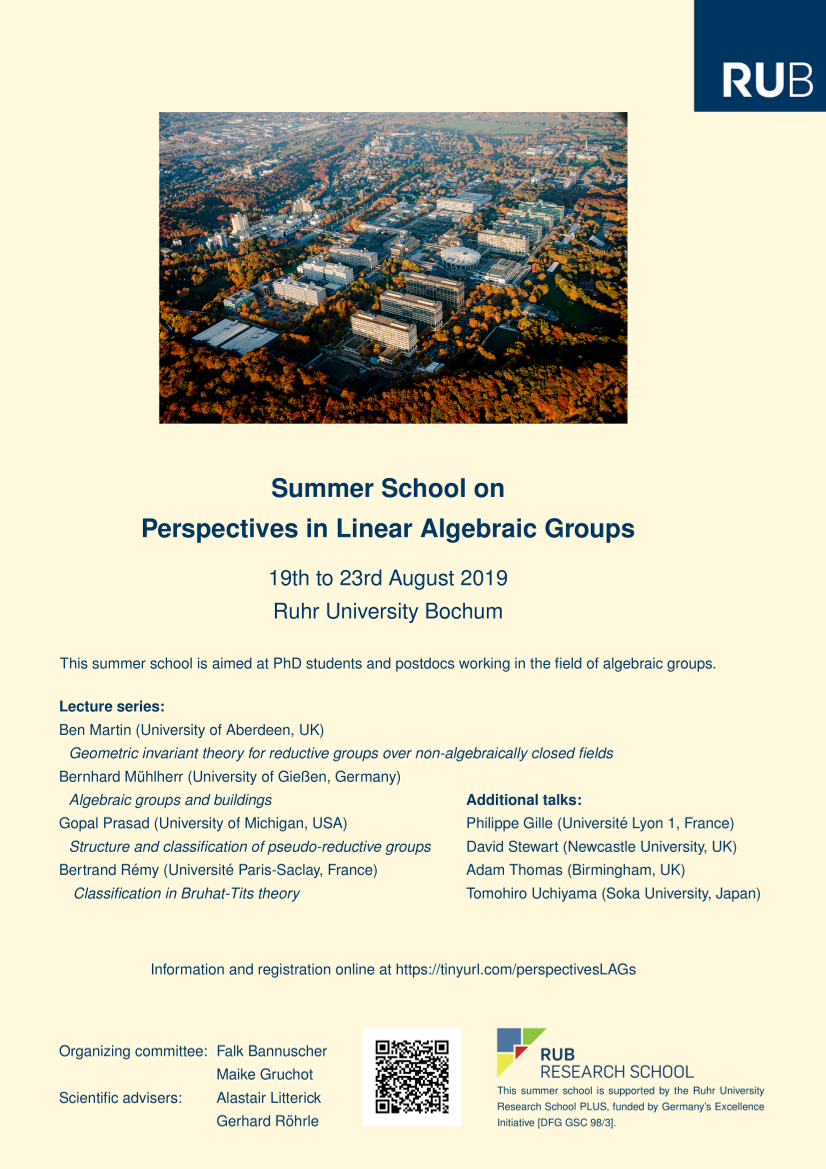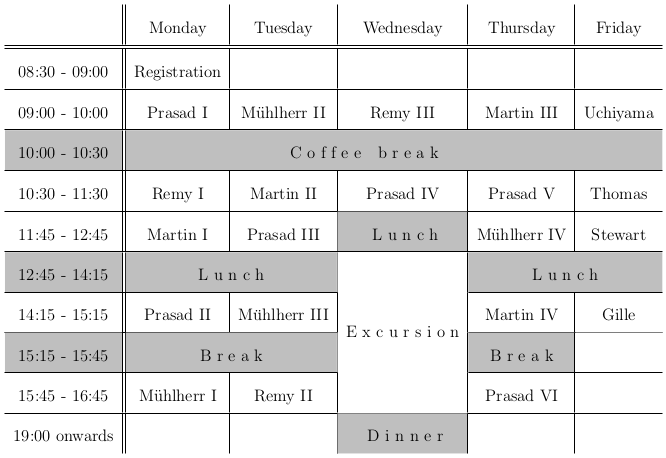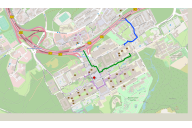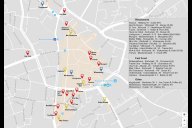Perspectives in Linear Algebraic Groups
19th–23rd August 2019, Bochum
Organizing Committee:
Falk Bannuscher,
Maike Gruchot
Scientific Advisers:
Alastair Litterick,
Gerhard Röhrle
This summer school aims at introducing junior researchers to a variety of topics in linear algebraic groups over arbitrary fields, with a focus on pseudo-reductive groups and unusual behaviour over fields which are not algebraically closed.
The school will consist of four lecture series given over four days, followed by a day of conference-style talks.
Lecture series will be given by Ben Martin (University of Aberdeen), Bernhard Mühlherr (University of Giessen), Gopal Prasad (University of Michigan) and Bertrand Rémy (Université Paris-Saclay). Additional talks will be given by Philippe Gille (Université Lyon 1, France), David Stewart (Newcastle University, UK), Adam Thomas (Birmingham, UK) and Tomohiro Uchiyama (Soka University, Japan).
Poster

Excursion and Dinner
The summer school will feature an excursion to the The Henrichshütte Ironworks, at around €16 per person (including public transport), as well as a conference dinner at Farina in the city centre (self-paid).
Online Registration
Online registration is now closed. Please address enquiries to Frau Claudia Knauber.
Accommodation
We have reserved a number of rooms from 18th-24th August at the Ibis Bochum Zentrum, at a special university rate. The hotel can be contacted at +49 234 33311 or at H1440@accor.com.
Schedule

- Talks will be held in the ID building, room 03/445.
- The dinner will take place at Farina (Bruderstraße 1, 44787 Bochum).
- For the excursion, please meet at 13:00 at the tram stop 'Ruhr-Universität Bochum'.
Lecture series abstracts
Ben Martin: Geometric invariant theory for reductive groups over non-algebraically closed fields
I will discuss aspects of geometric invariant theory for the action of a reductive group G on an affine variety X over an arbitrary field k. Rather than considering quotient varieties, I will focus on some variations on the Hilbert-Mumford Theorem. The Hilbert-Mumford Theorem says that if k is algebraically closed and an orbit G.x is not closed then we can reach a point outside G.x by starting at x and taking the limit along a suitable cocharacter λ. Work of Hesselink, Kempf and Rousseau showed that λ can be chosen in a canonical way (yielding a so-called ``optimal destabilising cocharacter’’). I will describe some extensions of these notions to the case when k is not algebraically closed. This theory can be formulated in the language of buildings, and it turns out that the existence of an optimal destabilising cocharacter is closely related to the Centre Conjecture for spherical buildings.
Reading material:
- Chapter 3 of Newstead, Introduction to moduli problems and orbit spaces (MathSciNet link) gives a gentle introduction to geometric invariant theory.
- My notes (link) also contain some relevant material: Section 3 summarises the necessary geometric invariant theory, Section 5 describes the construction of optimal destabilising cocharacters and Section 6 touches on non-algebraically closed fields.
- The relationship between geometric invariant theory and spherical buildings is described in Bate M.E., Martin B., Röhrle G. The strong Centre Conjecture: an invariant theory approach. J. Algebra 372 (2012), 505-530. MathSciNet link
Bernhard Mühlherr: Algebraic groups and buildings
The goal of the lectures is to describe the spherical building associated with an isotropic, absolutely simple algebraic group over a field and to provide applications. We present Tits' proof of simplicity of the corresponding abstract group and a building-theoretic approach to Galois descent in Borel-Tits theory. We explain in particular the Tits indices used in the classification of the semi-simple groups and focus on some examples of exceptional groups.
Reading material:
- Course notes
- B.Mühlherr, H.P. Petersson, R. Weiss, Descent in buildings. Annals of Mathematics Studies, 190, Princeton University Press. 2015. MathSciNet link
- R. Weiss, The structure of spherical buildings. Princeton University Press, 2003. MathSciNet link
Gopal Prasad: Structure and classification of pseudo-reductive groups
In my talks I will present the structure and classification of pseudo reductive groups given in the monographs "Pseudo-reductive groups" (2nd edition, 2015) by Brian Conrad, Ofer Gabber and Gopal Prasad, and "Classification of pseudo-reductive groups", Annals of Math Studies #191(2016), by Brian Conrad and Gopal Prasad. I will discuss various examples to illustrate the theory. A detailed summary is given in the survey article "Structure and classification of pseudo-reductive groups" in Proceedings of Symp. in Pure Math, Vol 94(2017), published by the American Math Society. It should be helpful to look at this article to follow the course.
Reading material
Bertrand Rémy: Classification in Bruhat-Tits theory
The goal of the lectures is to eventually enable students to use the classification kit contained in J. Tits’ Corvallis notes. This classification uses combinatorial devices which are specific to the situation of a local ground field; in particular, ramification in the splitting extension has to be taken into account. This calls for a connection with the classical objects used to classify reductive groups over arbitrary ground fields. We will also have to explain the main steps of the Galois descent(s), thanks to which an affine building is attached to a non-necessarily split reductive group over a local field.
Reading material: J.Tits, Reductive groups over local fields. In: Automorphic Forms, Representations and L-Functions, Part 1, Oregon State Univ., Corvallis, Ore., 1977, in: Proc. Sympos. Pure Math., 1979, pp. 29–69. MathSciNet link
Talk abstracts
Philippe Gille: On Serre’s conjecture II for groups of type E7
Serre’s conjecture II is a vanishing conjecture in non-abelian Galois cohomology. It was stated in 1962 and is still open for trialitarian groups and groups of type E. We shall discuss the state of the art on the topic focusing on the E7 case.
David Stewart: Irreducible representations of pseudo-reductive groups
We classify the irreducible representations of smooth, connected affine algebraic groups over a field, by tackling the case of pseudo-reductive groups. We reduce the problem of calculating the dimension for pseudo-split pseudo-reductive groups to the split reductive case and the pseudo-split pseudo-reductive commutative case. Moreover, we give the first results on the latter, including a rather complete description of the rank one case.
Adam Thomas: Complete reducibility and subgroup structure of exceptional algebraic groups
The notion of complete reducibility was introduced by J.-P. Serre in 1998. It generalises the notion of a completely reducible module in classical representation theory. After giving an introduction to complete reducibility for algebraic groups, we discuss its impact on questions about the subgroup structure of exceptional algebraic groups over algebraically closed fields. This includes recent and ongoing work with A. Litterick on classifying the subgroups of exceptional algebraic groups that are not completely reducible. The techniques used are a mix of standard representation theory, non-abelian cohomology and computational group theory.
Tomohiro Uchiyama: Rationality problems for complete reducibility
Let G be a reductive algebraic group defined over a nonperfect field k. In this talk, I will talk about various rationality problems concerning Serre's notion of G-complete reducibility for subgroups of G. In particular, I will present a concrete example of a subgroup of G that is G-completely reducible over k but not G-completely over an algebraic closure of k (and vice versa). Several open problems concerning complete reducibility and subtle interplays between complete reducibility and pseudo-reductivity will be discussed.
Arrival
We expect that most participants will arrive on Sunday 18th August, and will be staying at the Ibis Hotel Zentrum. In this case, you should head directly to the hotel. If you arrive at Bochum by train, you will notice the hotel as soon as you disembark; it is a tall white building with a large, red "Ibis" sign at the top.
Please be aware that most shops are closed on Sundays in Germany, and the Ibis Hotel Zentrum does not have a restaurant for dinner. However, a number of small cafes, fast-food outlets and bakeries do remain open, especially those located in train stations. Most shops do not accept credit cards, so make sure you have Euros on you if you do not own a Eurozone bank card (EC card).
Local registration
Registration on Monday morning will take place in building ID, Room 03/419 on the main campus, from 8:30am to 9:00am. During the registration we will collect the 14€ (in cash) for the excursion (please try to have the exact amount of cash ready) and in return you will receive coupons for our canteen where we will have lunch each day.
Getting to the registration room
If your hotel is in the city center (like the Ibis Hotel Zentrum) you can easily reach the Ruhr-University from Bochum Main Station (Bochum Hbf). You just need to take the underground train U35 (going to Bochum Hustadt) and leave the train at 'Ruhr-Universität'. From there it is just a 10-15 minute walk. The Conference Location map below has a green line indicating the route to the ID building.
Getting here by air
The nearest international airports to Bochum are Düsseldorf (DUS) and Dortmund (DTM). Cologne/Bonn Airport (CGN) is further away, but is on a direct railway line to Bochum. Be warned that Düsseldorf Weeze (NRN) is not easy to reach from Bochum.
From Düsseldorf International (DUS) you must take the 'SkyTrain' to Düsseldorf Flughafen railway station and change onto a main-line train. SkyTrain tickets can be purchased from machines at the station, and a separate ticket is required for the main-line train.
From Dortmund airport (DTM) the easiest route is to take the AirportExpress bus to Dortmund Main Station (Dortmund Hbf), and from there take a train to Bochum. Tickets for the AirportExpress can be purchased on the bus. A rail ticket must be purchased separately. Do not take the 'AirportShuttle' as this goes to a small local train station that is not useful for Bochum.
Getting here by rail
Bochum is very well-connected by rail. Frequent trains run from the main station (Bochum Hbf) to many other major cities. The main station is located in the city centre, and is immediately next to the Ibis Hotel Zentrum. The underground service (U-Bahn) U35 will take you directly from Bochum Hbf to the university campus.
The basic type of ticket is a 'VRR' ticket, which can be purchased from Deutsche Bahn ticket machines. Once stamped, this ticket will let you use all buses, U-Bahn, S-Bahn and local trains (RE/RB). The price of the ticket depends on how far you want to go. To get to and from Dortmund, you require a Zone B ticket (currently €5.80). To get to and from Düsseldorf, you require a Zone D ticket (currently €15). Note that these tickets do not let you use the IC or ICE train services.
CONSTRUCTION WORKS
Until the end of August 2019, there are construction works on the route from Düsseldorf to Bochum. Although this does not affect which ticket you should buy, there will be no fast connections between Dusseldorf Main Station (Düsseldorf Hbf) and Bochum Main Station (Bochum Hbf), and trains from other stations could also be affected (such as ICE trains via Dortmund Main Station). We recommend visiting the Deutsche Bahn website to find the best connection or to see whether your booked route is affected. You can also try to speak to a member of Deutsche Bahn staff in the travel office ('Reisezentrum').
Further information is available at https://inside.bahn.de/grossbaustellen/ (in German).
Local Information
Please be aware that most shops are closed on Sundays in Germany, and the Ibis Hotel Zentrum does not have a restaurant for dinner. However, a number of small cafes, fast-food outlets and bakeries do remain open, especially those located in train stations. Most shops do not accept credit cards, so make sure you have Euros on you if you do not own a Eurozone bank card (EC card).
Travel to the university
The easiest way to get to university is to take the underground route U35. You require a Zone A ticket for journeys within Bochum, which costs €2.80 for one trip or €10.20 for four. There is also the option to get a 24 hour ticket which can be shared in groups of up to five people.
The shortest way to get to the ID building is to get off the U35 at 'Lennershof', but you can also get there from the station 'Ruhr-Universität' (see map below).
Food and drink
See map below.
To view the privacy notice, click here.



